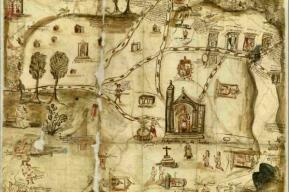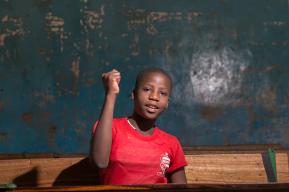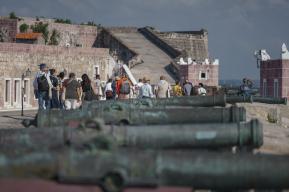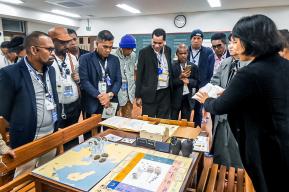News
Interview: Seven questions to Johnpaul Ekene Ikwelle, Culture of Peace & Youth Engagement Expert
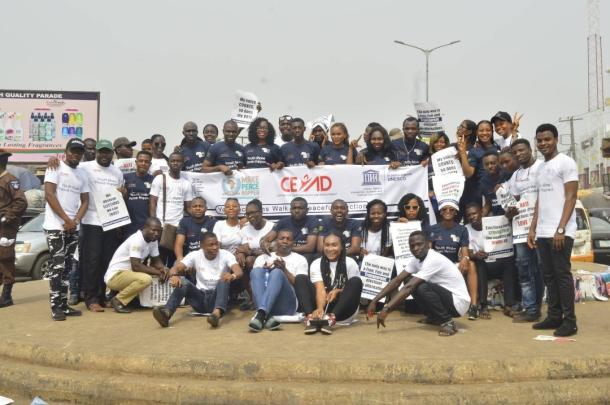
Johnpaul Ekene Ikwelle is one of the leading figures in youth civic engagement and the culture of peace in Africa. With over 12 years of experience in the area, he was the Chairperson of the Pan-African Youth Network for a Culture of Peace (PAYNCoP) and was one of the central participants of the Youth Forum at the first Biennale of Luanda in 2019.
and were also part of the UN Regional Consultation on UNSCR 2250 on Youth, Peace and Security, a component of the UN Secretary General’s progress study on youth’s involvement in peacebuilding.
Since the identification of emerging trouble spots and new conflict prevention through early detection is important, investments in the cross-pollination of an Early Warning architecture driven by grassroots young people to ensure safety, respect for rights of individuals and rule of law, would remain key and useful, and that is why we developed an early warning project for Central Africa and with support from UNESCO, UNOCA and ECCAS. We successfully linked our some of members into the African Union African Reporter system, and they were trained by the AU CPEWD on early warning reporting, among others.
Across Africa, Elections had remained one of the most important triggers of violence and instability, hence in 2018, we developed and led the Implementation of a Youth-Make-Peace-Happen campaign project using the tenacity and innovative capacity of youth to promote peaceful elections in twelve (12) selected African countries.
With funding from UNESCO, we successfully implemented the project concept in Sierra Leone (2018), Nigeria (2019), Cameroun (2019-2020) and Guinea Conakry (2020). The success of our Youth Make-Peace-Happen in Nigeria and Sierra Leone was overwhelming and it helped facilitate our invitation by the West Africa Network for Peacebuilding (WANEP) in collaboration with ECOWAS and African Union Commission to be part of the pre-election observation on-ground team who are involved in the situation and incidence reporting of election-related matters (basically early warning) at the state level across Nigeria; and eventually the election monitoring team for the 2019 Nigerian National Elections.
We took part in the first-ever African Union Peace and Security Council (PSC) Open Session on Youth, Peace and Security having participated actively in the development of a continental framework on youth engagement on Youth, Peace and Security led by the Conflict Prevention and Early Warning Division (CPEWD) of the Africa Union.
We also took part in the Member States Engagement with Youth on Conflict Transformation organized by ECOWAS and the ECOWAS Workshop on Youth and Private Sector Engagement in the Prevention of Violent Conflicts in West Africa.
We played a leading role in the organization of the Biennale of Luanda 2019, and its follow-up engagement for young people. As a representative for Africa at the UNESCO Youth Steering Group, we were instrumental to the co-designing and co-implementation of the UNESCO 11th Youth Forum 2019, and consequently the creation of the Global Youth Community (GYC).
We launched the online sports challenge against COVID-19 (#SportsAgainstCOVID19 contest) where, in partnership with UNESCO regional offices, we used the power of sports and social media to foster peace and security, meaningful youth engagement and compliance with health measures during the early stages of COVID-19 lockdowns across Africa, reaching over 1,000 young people. We celebrated and showcased African Youth Innovation aimed at preventing the spread of covid 19.
We are exemplary in youth4peace engagements recorded over a very short period of existence and have become one of the shinning lights of youth involvement in the promotion of a culture of Peace in Africa.
I think I might have to write a memoir about our engagements during my short period of leadership and celebrate all those who did the magic behind the seen and made those sacrifices.
3. What is the role of youth in achieving a culture of peace in Africa?
The role of youth in achieving a culture of peace in Africa, is in ownership and active engagement as partners and leaders, in all programs and projects that are geared towards building peace in Africa. It is a role that requires accountability, professionalism and long term focus. Young people must continue to lead through visible youth-led initiatives on preventing extremism; on fostering inclusion especially for minority groups; on changing laws that are designed to exclude them from participating in governance; on fostering social justice and democracy and respect for human rights; on demanding accountability and transparency from elected leaders of their countries and communities; on finding emerging strategies to manage diversity; on addressing structural injustices and promoting equality; and by continuing to play active roles in the building of the African We Want.

4. What can be done to ensure that youth-led initiatives for a culture of peace receive the attention and funding they deserve?
I think it is by intentionally mapping support for youth-led initiatives as cooperation, agencies and foundations build their strategic engagement plans for the year. We must transform the lens from which we see young people (from beneficiaries to partners and leaders), and by so doing, give youth-led incentives more funding that goes directly to youth-led groups and organizations. We should also tell and amplify the positive stories of impact of youth-led initiatives, and we must stop (now and today) lip-service in terms of support for youth engagement. Engagements must be meaningful, and transformative. We must consider reducing the requirement for accessing funding for youth-led initiatives and make those requirements more youth-friendly. Youth-led initiatives should not have to bring the forefathers lands to access support.
Young people themselves must continue to show that they are accountable and transparent in their engagements.
5. In 2019 you participated in the Youth Forum of the first edition of the Biennale of Luanda – “Pan-African Forum for the Culture of Peace”. Could you tell us about it and about the recommendations gathered in the Commitment of African Youth for the Culture of Peace made by the Youth Forum’s participants during the Biennale?
The Youth Forum process started online weeks before the forum itself, as we used severally discussions to engage young people and draw out their experiences and contribution. We designed it intentionally because we knew that severally young people would not be physically present at the Biennale of Luanda, hence we tried to ensure that we didn’t leave people behind. We call for project ideas and selected some to be included as the projects to be showcased during the Partners forum, I am not sure what has happened with that process. At the end of the online deliberations, we agreed and adopted a Position Statement even before the forum, endorsed by several young people.
At the Youth forum proper, two sessions on Peace and Security, and on Entrepreneurship and Innovation were held, and it became a safe space for young people to share knowledge, experiences and make proposal towards the outcome of the entire Biennale of Luanda with focus on youth issues.
The recommendations from the two sessions, were then incorporated into the Position Statement, which then was transformed into the Commitment of African Youth for the Culture of Peace. Young people did not just want to make recommendations to the policy leaders and development partners, they also made commitments which ensured that the Lens with which young people are viewed, is transformed from beneficiaries to Partners and Leadership. Recommendations covered several sectors from peace and security to entrepreneurship and innovation, to Education and intergenerational knowledge sharing program etc.
An adhoc committee was set up to follow up on the implementation of the commitment, and report at the next Biennale. PAYNCoP is leading the committee and I hope the report will be positive.

6. For this second edition of the Biennale of Luanda, a dialogue between 150 young people from the continent and the diasporas, and African political and economic leaders will be organized. What would you like to see during these discussions?
I would like to see discussions around the increasing rate of police brutality across Africa, and the disappointing level of respect of human rights across Africa and the shrinking of civic spaces across our continent especially for minority groups. I would like to see discussions around human capital development of young people across Africa, and the celebration of the agency and ingenuity of the African Youth. I would like to see a platform for knowledge transfer between young Africans in the global north and the global south.
7. What advice would you give to young Africans who would like to become more involved in projects related to social inclusion and youth civic engagement across the continent?
I think the first step would be to find your preferred area of engagement, and this could be a journey that takes you through different fields, hence you are going to need to find and trust your process, as no two persons will have an exact process path.
Whatever the path (entrepreneurship, education, formal or informal job sectors, private sector, politics, non-for-profit et cetera) he or she chooses, the goal should be first, to build capacity and learn as they grow. Join youth groups with clear story of impact and find a strategy to cultivate your brand starting from your immediate environment.

Find out about the Biennale of Luanda here


